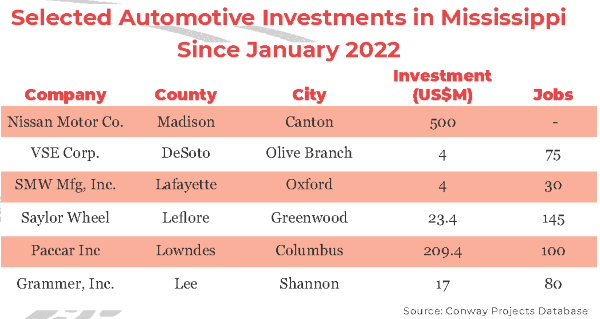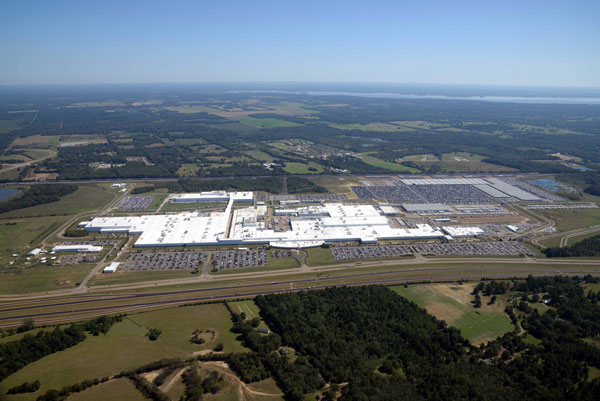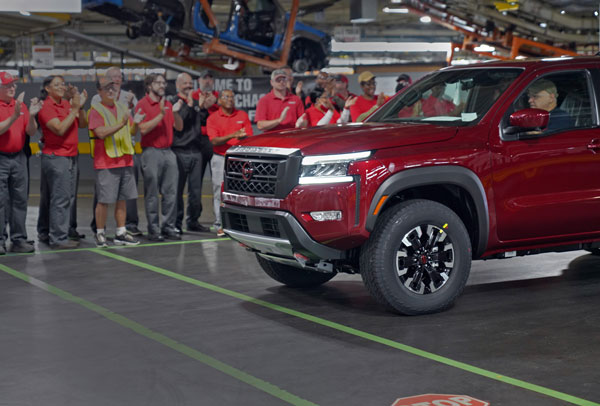Staffed by 15,000 employees and supported by such institutional assets as Mississippi State University’s Center for Advanced Vehicular Systems and the University of Mississippi’s Haley Barbour Center for Manufacturing Excellence, Mississippi’s more than 200 automotive manufacturers are evolving with the rest of the world — even as that evolution requires a measured pace.
Canton, Mississippi, is where vehicle manufacturing in the Magnolia State got its jumpstart 21 years ago when Nissan located its plant there. Today that site employs 5,000. In early 2022, the company committed to a $500 million investment to transform the assembly plant to build new Nissan and Infiniti EV models. The move supports retraining and upskilling nearly 2,000 jobs.
That move is still underway even if global EV market forces have induced a tap on the brakes by Nissan and so many others.
“Nissan remains committed to the future of mobility and electric vehicle production,” says a spokesperson for Nissan Group of the Americas. “Our Canton, Mississippi, factory will transform into a Nissan Intelligent Factory, supporting the manufacture of next-generation vehicles using innovative technologies and contributing to the realization of carbon neutrality. As part of our strategic planning, we have adjusted the timeline for the introduction of certain electric vehicles. Our goal is to ensure we bring the right mix of models to the market at the right time, prioritizing the needs of our customers.

“We have identified the opportunity to add three new electric vehicles in addition to the two electric vehicles previously announced,” she continues. “We are taking this opportunity to develop the right cadence for these new models to maximize our market opportunity and ensure the strongest business for both our company and our suppliers who will support the programs.”
A start-of-production date for what will be the company’s first EV has not been announced, she says, but “we are committed to upskilling current employees and will evaluate additional headcount needs in the future.”
The Nissan plant builds the Altima, Frontier, TITAN and TITAN XD models and has produced over 5 million vehicles since its 2003 opening. The company’s commitment to Mississippi has been unwavering: Even before the 2022 announcement, it had invested $3.5 billion at the Canton site.
Mullen on the Move
It’s not the only company committing to growth in the state, however.
Mullen Automotive, the California-based maker of commercial EVs, has been assembling vehicles in the Tunica County town of Robinsonville, Mississippi, since August 2023. In May, the company learned it had been approved for Foreign Trade Zone (FTZ) status with the U.S. Department of Commerce for its 100-acre commercial vehicle manufacturing and assembly center under the FTZ program’s alternative site framework.
“With FTZ approval, the Company now qualifies for a variety of benefits, including deferment of payments on duties related to import fees,” Mullen stated. “For domestic U.S. sales, the company is now able to match import duty payment to when vehicles are shipped from the zone. This key FTZ benefit reduces the pressure on cash flow, which is significantly different from the previous model of paying duty at time of port entry. Mullen estimates that resulting deferred working capital on domestic sales could result in deferred outlays of up to $21 million for FY2024 and FY2025.”
For international sales, Mullen is now 100% exempt from duties and taxes owed on vehicles exported, “returning a bottom-line pick-up of up to 27% on vehicle kits and 11% on vehicle batteries for a blended average of 20% on the full duty cost associated with both Class 1 EV cargo vans and Class 3 EV trucks,” the company said.
“Foreign Trade Zone approval for our Tunica facility is a significant milestone for us, further strengthening our manufacturing position while delivering a competitive advantage and cash flow saving opportunities,” said David Michery, CEO and chairman of Mullen Automotive. “This approval also helps the overall economic development of the local Tunica, Mississippi, community.”
 Nissan’s plant in Canton, Mississippi, which employs 5,000 people, will be gradually transformed into a “a Nissan Intelligent Factory supporting the manufacture of next-generation vehicles,” the company says.
Nissan’s plant in Canton, Mississippi, which employs 5,000 people, will be gradually transformed into a “a Nissan Intelligent Factory supporting the manufacture of next-generation vehicles,” the company says.
Photo courtesy of Nissan Group of the Americas
The company in April passed the milestone of producing its 500th commercial vehicle, noting that it has 18 active commercial vehicle pilots with fleets, municipalities, universities and campuses underway. Mullen is expanding its U.S. retail dealer network while also expanding vehicle distribution in Europe.
Among other notable expansions in the state over the past two years:
- VSE Corporation, a provider of aftermarket distribution and maintenance, repair and overhaul (MRO) services for land, sea and air transportation assets for commercial and government markets, opened a new distribution and e-commerce fulfillment center of excellence in Olive Branch, located in DeSoto County in the Greater Memphis metro area. The $4 million investment adds 75 new jobs at the new 450,000-sq.-ft. facility. “The addition of our new distribution center is an important strategic milestone for our Wheeler Fleet Solutions subsidiary, one of the leading fleet-focused parts and services companies serving heavy, medium and light duty vehicles in the United States,” said John Cuomo, president and CEO of VSE Corporation, in a news release. “During the last four years, our commercial fleet sales have grown from approximately 10% to 40% of Fleet Segment revenue, driven by share gains across both commercial fleet and e-commerce fulfillment channels.”
- German vehicle seating system manufacturer Grammer, whose Americas division is based in Toledo, Ohio, has operated for a decade in the Tupelo-area community of Shannon in Lee County and recently invested $17 million in an expansion that created 80 new jobs.
- Saylor Wheel in May 2023 announced it would locate a $23.4 million, 145-job manufacturing facility in the Jackson-area community of Greenwood to make tire and steel wheel assemblies for the trailer industry with the steel wheels vertically integrated into the manufacturing process. The investment includes the purchase and rehab of an existing building in Greenwood, as well the purchase of manufacturing and non-manufacturing equipment, aided by the Mississippi Development Authority’s Mississippi Flexible Tax Incentive (MFLEX). “Two words come to mind regarding the start of Saylor Wheel: gratitude, and teamwork,” said David Saylor, president of Saylor Wheel, LLC. “Teamwork by the Delta Council, the Economic Development Foundation, the city, the county, the state of Mississippi, the USDA, our political leaders, our investors, the community development entities MRC and Southern Bancorp, and the numerous professionals that critically contributed to this project — they made this company a reality. My gratitude for their help exceeds my reach for words. Now is the time to make wheels in the Delta.”

